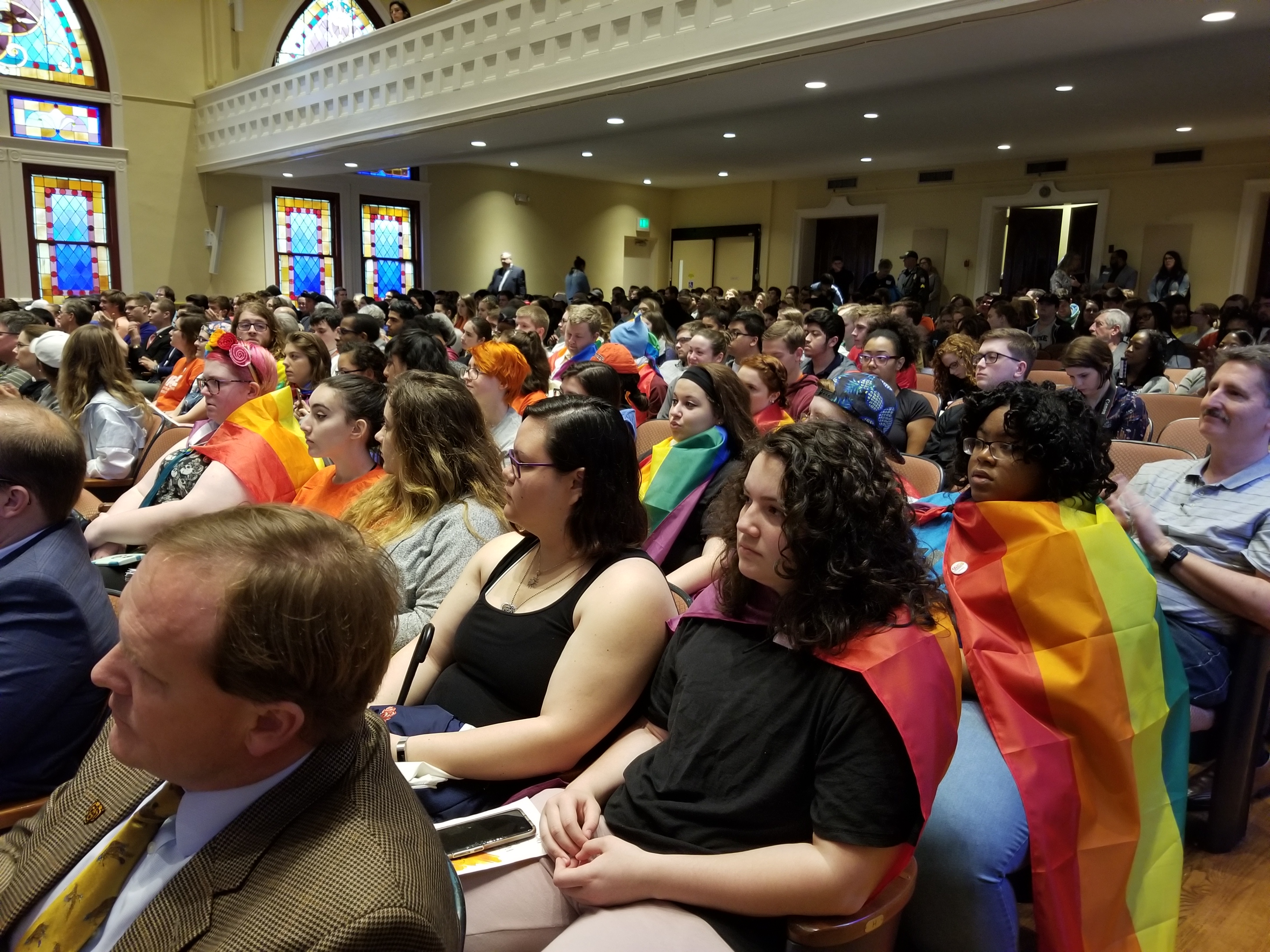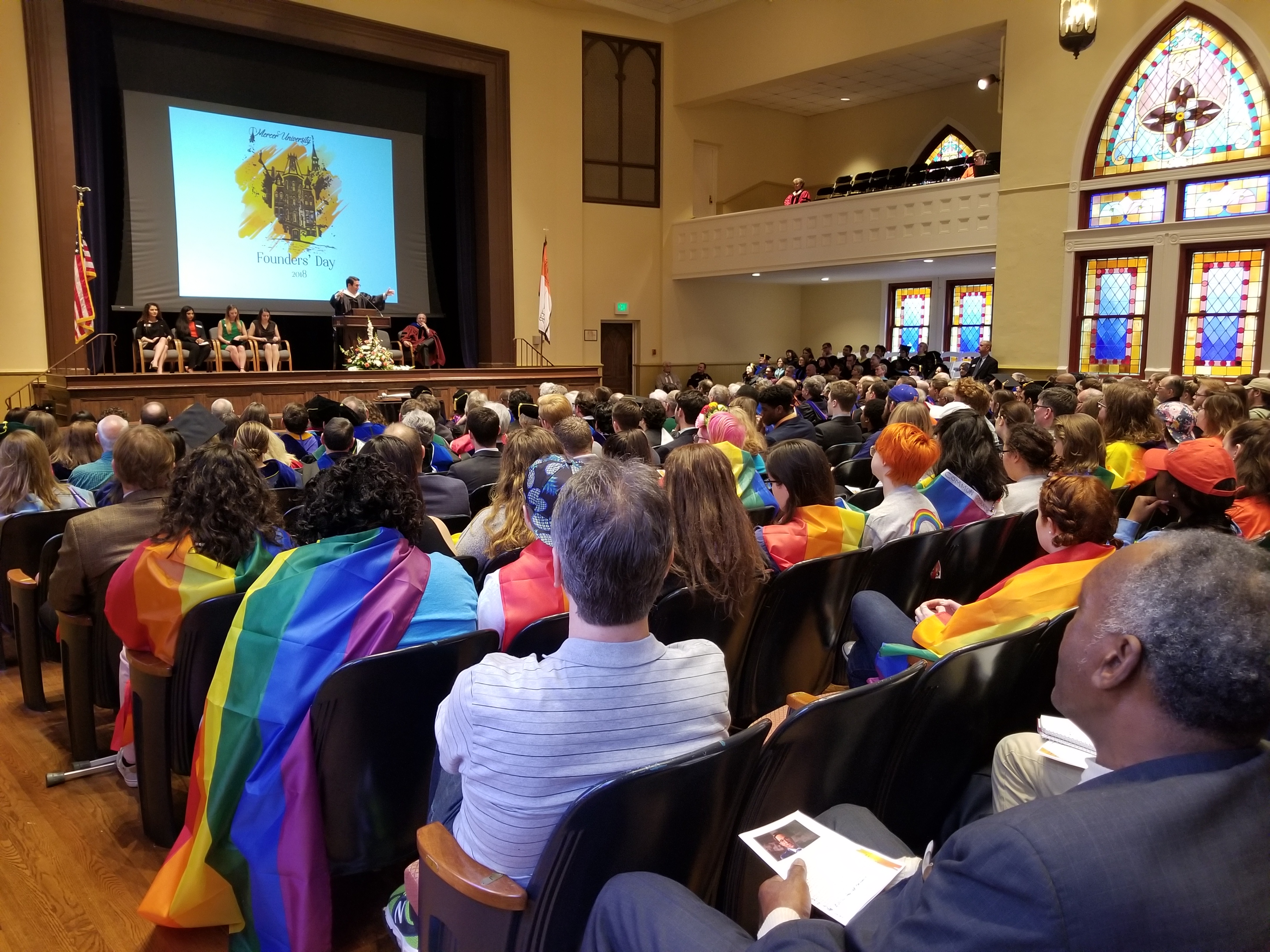MACON, GEORGIA — Students at Mercer University wore rainbow flags around their shoulders and sat in silent protest Wednesday, while Jay Sekulow, personal counsel to President Donald Trump and chief counsel at the American Center for Law and Justice (ACLJ), delivered the school’s Founders’ Day address.
In the weeks since the historically Baptist school announced Sekulow’s speech, controversy arose among students, faculty, and alumni who opposed Sekulow’s history of anti-LGBTQ and bigoted statements and actions.
More than 600 students and alumni signed an online petition since the announcement asking the Mercer administration and student government to reconsider the decision, citing its “long and distinguished tradition of promoting human dignity, fostering inclusion, and celebrating differences,” and calling attention to Sekulow’s “long and well-documented history of homophobia, racism, nationalism and anti-Muslim bigotry.”

Mercer’s decision to host Sekulow, though met with opposition, was not altogether surprising. Despite its stated commitment to “affirm and respect the dignity” of all, Mercer has a long history of failing its marginalized students, particularly those who are LGBTQ. As a student there from 2001 to 2006, I co-founded the school’s first-ever officially recognized gay-straight alliance. In 2006, the Georgia Baptist Convention (GBC) threatened to sever its historic ties with the university over a planned Coming Out Day event, which led administrators to pressure the group’s current leadership into disbanding.
In apparent response to the heightened tensions surrounding Sekulow’s speech, Mercer president William Underwood opened the event by highlighting the “Baptist traditions of freedom of thought and belief.” Vice President and Dean of Students Doug Pearson then spoke, telling attendees that, “Mercer values each and every one of us,” and encouraging students and alumni to “Set aside our preconceived notions” and focus on the shared experience of being “Mercerians.”
Sekulow, who attended Mercer for both his undergraduate and law degrees, seemed well aware of the controversy surrounding his presence, repeatedly referring to his commitment to free speech, and naming various religious minority groups for whom he advocated in court over the years. He carefully avoided any direct mention of his current client, President Trump.
“It felt a bit self-contradictory,” said openly transgender Mercer student McPherson Newell of Sekulow’s speech. “It felt like he was talking a lot about the importance of listening to other viewpoints when his was the only viewpoint being shared. We weren’t protesting the cases he’s argued, but his personal beliefs and the organizations that he’s worked with.”
Sekulow has an extensive history of championing anti-LGBTQ causes, both personally and through the ACLJ, a conservative Christian law firm founded by Pat Robertson in 1990 that has made millions on so-called “religious liberty” cases. In one such case, the ACLJ’s Moscow branch backed Russian President Vladimir Putin’s push to ban “gay propaganda.” Sekulow has also made numerous comments over the years characterizing same-sex marriage as immoral and a threat to the “traditional family.”

“Our purpose was never to make them reverse the decision or prevent him from speaking, but we were trying to call attention to the fact that what he represents isn’t what all of Mercer represents,” said Newell, leader of the campus LGBTQ student organization Common Ground, which coordinated the silent protest.
“It was very isolating,” Newell told ThinkProgress. “Especially because the loudest voices among the students were the ones telling us to be quiet. There were a lot of people telling us to be quiet. We’re quiet about who we are every day on this campus, so it felt very isolating.”
While the Mercer Founders’ Day speech was largely subdued, with Sekulow focusing mostly on lighthearted anecdotes about his time at Mercer, a Q&A session with students and faculty later in the day gave way to dissension. Students asked Sekulow pointed questions about his opposition to same-sex marriage, and his role as the leader of what they called a “hate group.”
Sekulow repeatedly denied responsibility for ACLJ-branded literature that was distributed in Zimbabwe encouraging the criminalization of homosexuality, telling attendees not to “believe everything you read.” One student cited remarks by Sekulow in which he compared recognizing same-sex marriage to calling a dog with a tail a five-legged dog. Sekulow denied ever having made the remarks, but became noticeably defensive when someone in the crowd called him a “liar.”
When one student asked what advice Sekulow would give to young LGBTQ Christians who struggle against conservative religious teachings to the point of having suicidal thoughts, Sekulow claimed to have spent time talking to LGBTQ Christians, responding, “I don’t think someone should be put in that situation.”
Attendees at the Q&A session also questioned Sekulow’s history of anti-immigrant and anti-Muslim statements, and asked his perspective on the Israeli-Palestinian conflict as one of the leading American attorneys who has provided legal counsel for Israel. Sekulow said that while not all Muslims posed a danger to the United States, “the militant Islamic threat is real.”
For current and former LGBTQ students, the events were a difficult reminder of their marginalized status on campus.
“Fundamentally, you realize that there are people you are with [on campus] who don’t think you should be allowed to be who you are,” freshman student and Common Ground member Aliyah Dorsey told ThinkProgress. “I get why the university wanted him to come, but I think they should have thought about who it would affect and how that would make us feel. Knowing that a person like that who holds such hateful values could be welcomed into a space I temporarily call home is upsetting.”
“I loved a lot about my time at Mercer,” recalled Mercer graduate Kyle Shook, who was an officer in Common Ground from 2011 to 2012. “There were some terrific faculty who helped me grow academically and as a more socially conscious person. However, there is a lot of progress yet to be made for LGBT students.”
Shook pointed to pervasive issues of harassment from faculty and students, and the challenges LGBTQ students still face with regard to healthcare access and gender-neutral facilities.
“As a whole, it can be a bit negative, but there are more open and accepting environments,” said Newell about the campus climate for LGBTQ students. “As a trans student, it’s more difficult, and I’ve experienced discomfort and prejudice, but faculty have supported us.”
“I strongly urge Mercer to engage with queer students and talk about what will help them thrive,” said Shook. “I don’t know that the university realizes the very real fear that queer kids at Mercer face. For many of them, the Mercer campus is the only place they can exist openly. There is an ethical responsibility on the part of the school to set high expectations for the safety and protection of queer students, particularly queer students of color who are still frequently left out of the conversation. It is going to take serious work, but if Mercer wishes to live up to its mission statement, it is urgent, necessary, and long overdue.”
Beth Sherouse is a writer and activist based in Atlanta.
